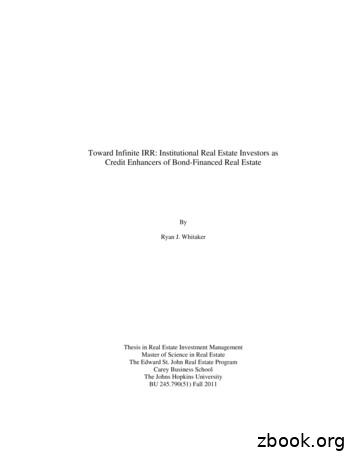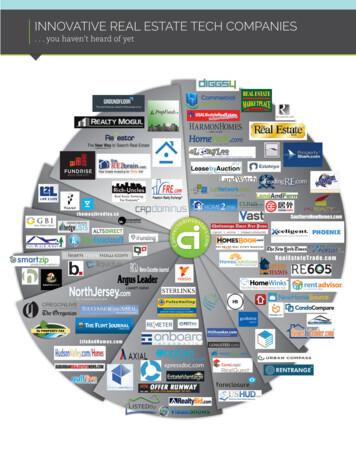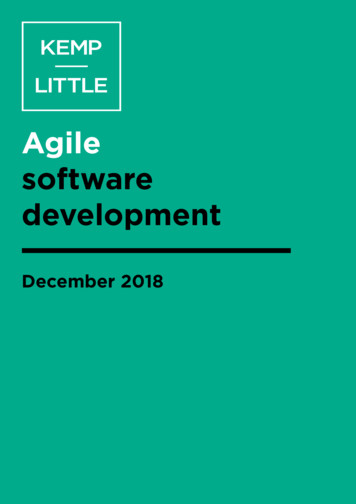REAL ESTATE - University Of Baltimore
GUIDE TO GRADUATION ACADEMIC YEAR 2019–2020B.S. in Business AdministrationREALESTATEAND ECONOMIC DEVELOPMENT SPECIALIZATIONwww.ubalt.edu/realestate1
The Merrick School of Business is committed to providing the guidanceand support you need to complete your program in a timely manner.This Guide to Graduation provides the in-depth information necessaryto assist you in planning your undergraduate academic career. It contains acomplete checklist of required courses and a suggested plan of study, as wellas detailed course information, including course prerequisites and projectedcourse offerings.While this information will be helpful to you, you should also contact the MerrickAdvising Center. The advisers are there to assist you in planning your programplan of study and to answer your questions. Advisers are available during theday and the evening. Students in the online programs and who do not haveaccess to the campus will be advised electronically. All new students arerequired to meet with an adviser prior to registering for their first semester toreceive a personalized program checklist.Consistent and timely academic advising is strongly related to student success.To enhance the services we provide to our students and increase the likelinessfor success and on-time degree completion, UB requires mandatory milestoneadvising for all new undergraduate students.Milestone advising is anchored by three specific touch points and alignedwith the personal, professional and academic goals of students at those points.The touch points are: 45 credits: Advisers will work with students to further explorethe declared major and connect students with support services, clubsand other campus groups to enhance the opportunity to be involved inthe UB community.60 credits: Advisers will work with students to prepare for internships,global field studies and other experiential learning opportunities.Students will also be reintroduced to the support services offered by theCareer and Internship Center.90 credits: Advisers will focus on the final steps to graduation and theoptions for post-bachelor’s degree completion. Students will learn moreabout the graduate degree programs at UB that fit their goals.Students who have reached these important milestones must meet with theiradvisers to discuss their next steps for registration, course scheduling and otherkey academic topics before they register for classes. Advisers will release themilestone advising service indicator on students’ accounts at the conclusionof the advising meetings. Although your academic adviser will assist you inplanning your program, it is ultimately your responsibility to complete the degreerequirements and acquaint yourself with the University’s academic policies.Merrick School of Business Code of ConductThe Merrick School of Business offers a student-centered education, in whichdegree candidates must take primary responsibility for their own learning.Our faculty promotes high academic standards that enable engaged andcurious students from diverse backgrounds to maximize their chances ofcareer success. In a global economy that is increasingly uncertain, a School ofBusiness degree stands for a commitment to lifelong learning, rigorous thinking,and professional, ethical and civil behavior. These attributes are valued byemployers, customers, investors, and other stakeholders in the local, national,and global marketplaces.For the complete Merrick School of Business Code of Conduct please visit:www.ubalt.edu/merrickconduct. Also visit www.ubalt.edu/studenthandbookto review the University’s Academic Integrity Policy.2CONTACT INFO:MERRICK ADVISING CENTERBusiness Center Room usinessadvising@ubalt.eduMichael Swaby-RoweManager,Undergraduate Advisingmswaby-rowe@ubalt.eduImani ChiusanoAcademic Adviserichiusano@ubalt.eduDawn TaylorAcademic Adviserdtaylor@ubalt.eduShawnte WareAcademic Advisersware@ubalt.eduOFFICE OF RECORDSAND REGISTRATIONwww.ubalt.edu/recordsOFFICE OF FINANCIAL AIDwww.ubalt.edu/financialaidBURSAR’S OFFICEwww.ubalt.edu/bursarACADEMIC SUCCESSCENTER – RLB LIBRARYwww.ubalt.edu/successCAREER ANDINTERNSHIP CENTERwww.ubalt.edu/careercenterCALL TO SCHEDULEYOUR ADVISINGAPPOINTMENT TODAY!
PROGRAM CHECKLISTAcademic Year 2019-20B.S. in Business Administration-Real Estate and Economic Development SpecializationName:Student ID number:DEGREE REQUIREMENTSSemester:UB COURSECREDITSTRANSFERRED UB CREDITSGeneral Education Requirement (A Minimum of 38 gen ed credits are required. Non-business gen ed requirements are indicated below. Business core requirementssatisfy an additional 15 credit hours of gen ed.)First-Year Seminar: Intro to Univ. Learning (only for UB freshmen)IDIS 1013Introduction to Information Literacy (only for UB freshmen)INFO 1103Arts & Humanities1 (AH)3Arts & Humanities1 (AH) (must be different discipline)3Social & Behavioral Sciences1 (other than Econ) (SBS)3Bio & Physical Sciences1 (BPSL)3Bio & Physical Sciences (with lab)1 (BPSL)3-4English Composition (COMP)WRIT 1016Upper-Division Ethics (AHE)IDIS 3023Upper-Division Writing (UCOMP) (placement test required)WRIT 3003Introduction to Financial AccountingACCT 2013Introduction to Managerial AccountingACCT 2023Business Law IBULA 1513Oral Communications (ELECGE)2 (GR-OC)4CMAT 201 or 3033The Economic Way of Thinking (SBS)BUSINESS REQUIREMENTSLOWER-DIVISION BUSINESS CORE (24 credits)ECON 2003College Algebra (MA/ELECGE)2MATH 1113Introductory Statistics (MA/ELECGE)2MATH 1153Statistical Data AnalysisOPRE 2023Money and BankingECON 3083Financial ManagementFIN 3313Management Information Systems (ELECGE)2 (GR-IL/TF)4INSS 3003Management & Organizational BehaviorMGMT 3013Global Business Environment (GR-GD)3MGMT 3023Human Resource ManagementMGMT 3153Personal & Professional Skills for BusinessMGMT 3301Excel for Financial AnalysisFIN 3303Marketing Management (GR-IL)4MKTG 3013Business Application of Decision ScienceOPRE 3153Strategic ManagementMGMT 4753Introduction to Economic Development (GR-GD)4ECON 3123Real Estate Principles & TransactionsREED 3123Real Property LawREED 3153Property ManagementREED 4803Real Estate Finance (Capstone) (GR-CAP)4FIN 47132UPPER-DIVISION BUSINESS CORE (31 credits)REAL ESTATE REQUIREMENTS (18 credits)Approved REED Elective3Number of electives required to meet 120 creditsTOTAL TRANSFER CREDITS:TOTAL CREDITS REQUIRED:TOTAL CREDITS EARNED:MINIMUM OF 120 CREDITS:1. Please refer to the UB General Education Requirements webpage for a complete list of general education course options.2. These business core requirements also satisfy general education requirements.3. These courses are approved to meet UB’s Graduation Requirements (GR). Refer to the UB Graduation Requirements webpage for detailed information.Advised by (initials):Date:3
GUIDE TO GRADUATIONB.S. in Business Administration-Real Estate and Economic Development SpecializationBelow is an example plan of study for the B.S. in Real Estate and Economic Development program. This is meant to act asa guide, but need not be followed in the same order for every student. Part-time students and those students transferring incredits from another university or college will need to adjust their plan accordingly. This plan does not account for coursestaken during summer sessions. Students should consult with their adviser each semester prior to registration.FALL SEMESTERSPRING SEMESTERFRESHMENIDIS 101Applied Learning & Study SkillsCMAT 201Communicating EffectivelyINFO 110Intro to Information LiteracyWRIT 101College CompositionMATH 083,084,085or MATH 111College AlgebraGeneral Education or Lower-Level ElectiveGeneral Education or Lower-Level ElectiveGeneral Education or Lower-Level ElectiveGeneral Education or Lower-Level ElectiveGeneral Education or Lower-Level ElectiveSOPHOMOREACCT 201Intro to Financial AccountingACCT 202Intro to Managerial AccountingBULA 151Business LawECON 200Economic Way of ThinkingMATH 115Introductory StatisticsOPRE 202Statistical Data AnalysisGeneral Education or Lower-Level ElectiveGeneral Education or Lower-Level ElectiveGeneral Education or Lower-Level ElectiveGeneral Education or Lower-Level ElectiveJUNIORFIN 331Financial ManagementECON 312Introduction to Economic DevelopmentINSS 300Management Information SystemsFIN 330EXCEL for Financial AnalysisMGMT 330Personal & Professional Skills for BusinessIDIS 302Ethical Issues in Business & SocietyREED 312Real Estate Principals & TransactionsMKTG 301Marketing ManagementWRIT 300Advanced Expository WritingREED 315Real Property LawFIN 471Real Estate Finance (Capstone)REED 480Property ManagementREED 475Real Estate Market AnalysisReal Estate ElectiveReal Estate ElectiveProgram ElectiveProgram ElectiveElectiveSENIOR*Program ElectiveIMPORTANT STUDENT INFORMATION: Note:4Elective*Be sure to apply for graduation.Maintain a minimum cumulative grade point average of 2.0.Earn a minimum grade of “C” in all lower- and upper-division business core and specialization requirements(including business elective requirements).Earn a minimum grade of “C-” in all lower-level general education requirements taken at UB and a minimum gradeof C (2.0) in all upper-level general education requirements.Students are limited to three attempts to successfully complete all lower-and upper-division business core andspecialization requirements.Apply up to 63 credits of community college work or up to 90 credits of four-year college or university work towarddegree requirements, unless an articulation agreement stipulates otherwise.Complete at least 30 credits at the University of Baltimore.PLACEMENT TESTING is required for MATH 111 College Algebra and WRIT 300 Composition and Research.For complete information visit the following website: www.ubalt.edu/placement. Placement tests must becompleted by the second semester.Please check the current catalog for all courses that satisfy general education requirements.The last 30 credit hours of your program must be taken at UB. To take courses outside UB toward your program,you must obtain approval from your academic adviser.The provisions of this fact sheet are not to be regarded as a contract between the student and the University of Baltimore. The Merrick School reserves the rightto change courses, schedules, calendars, and any other provisions or requirements. Students are responsible for the selection of courses, completion of degreerequirements, and acquainting themselves with academic policies.
LOWER DIVISION BUSINESS REQUIREMENTSCOURSECOURSE TITLECOURSE DESCRIPTIONPREREQUISITESEMESTERSOFFEREDACCT 201Introductionto FinancialAccountingA comprehensive study of basic financial accounting processesapplicable to a service, merchandising and manufacturing business.An analysis of transactions, journalizing, posting, preparation ofworking papers and financial statements.ACCT 202Introductionto ManagerialAccountingAn introductory study of managerial accounting processes includingjob order costing, process costing, cost-volume-profit analysis,standard costs, activity-based costing, cost analysis, budgeting andmanagerial decision making.BULA 151Business LawA basic study of the judicial system, contracts, agency, fraud, sale ofpersonal property, warranties, transfer of title and legal remedies.Fall, Springand Summer*CMAT 201CommunicatingEffectivelyIntroduction to oral communication: interpersonal, small group andpublic speaking. Emphasis on accurately transmitting information,using effective strategies for informing and persuading, usingeffective communication techniques to work with others, and feelingat ease in front of an audience.Fall and SpringCMAT 303ECON 200MATH 111MATH 115OPRE 202OralCommunicationin BusinessFall, Springand Summer*ACCT 201or equivalent witha minimum gradeof CExtensive practice in presentational speaking, briefing techniques,the mechanics and dynamics of group meetings and thedevelopment of interviewing, critical listening and interpersonalcommunication skills. Laboratory fee required.Fall, Springand Summer*Fall, Springand Summer*Note: If students have already completed CMAT 201, they don’tneed to complete CMAT 303.The Economic Wayof ThinkingAn economist sees the world in a unique way and is able to providea different perspective on many issues. This course presents the“economic way of thinking” with an emphasis on being able to makeeffective decisions in a wide variety of economic and businesssituations. In addition, the “economic way of thinking” is used tounderstand the impact of business and government policies andactions on our daily lives.College AlgebraProvides students with more advanced skills required for high-levelapplications of mathematics. Negative and rational exponents;functions, their properties and operations including inverse functions;linear, quadratic, polynomial, rational, absolute value, exponentialand logarithmic functions are explored. Students develop graphicaland algebraic skills and study applications of concepts.Adequateplacementtest score orsuccessfulcompletion ofMATH 083,084,or085.Fall, Springand Summer*Introduction toBusiness StatisticsAn overview of descriptive and inferential statistics. Statistics isinherently applied; the course emphasizes solutions to problems ina variety of applied settings. Measures of location and variability,probability distributions, correlation and regression, sampling andsampling distributions, hypothesis testing and estimation withconfidence intervals for means and proportions are explored.Adequate scoreon placementtest or successfulcompletion ofMATH 111 orits equivalentor successfulcompletion ofMATH 083,084,or085.Fall, Springand Summer*Statistical DataAnalysisA second course in the statistical analysis of data related to businessactivities with emphasis on applications in various functionalareas including accounting, finance, management, marketing andoperations management, among others. Topics include estimation,hypothesis testing, contingency tables and chi-square test, analysisof variance and covariance, simple and multiple regression analysisand correlation analysis. Computer implementation using Excelbased statistical data analysis or other relevant software andinterpretation of results for business applications are emphasized.MATH 115 andbasic computerskillsFall, Springand Summer*Fall, Springand Summer** Summer offerings may vary5
BUSINESS CORE REQUIREMENTSCOURSEECON 308FIN 331INSS 300MGMT 301MGMT 302MGMT 315MGMT 330COURSE TITLEPREREQUISITESEMESTERSOFFEREDMoney and BankingMoney and Banking focuses on financial markets and theirinteraction with the stability and growth of the U.S. economy. Thecourse will be useful for all undergraduate business majors andwill encourage a sound understanding and appreciation of topicsfrequently cited in the business press.OPRE 202 andeither ECON200 or 6 hoursof economicscourseworkFall, Springand Summer*FinancialManagementAn overview and understanding of fundamental principles offinancial decision making and their application to internal andexternal problem solving by the business enterprise. Topicsinclude financial statement analysis and forecasting, time value ofmoney and security valuation, corporate capital budgeting, cost ofcapital and capital structure. Thematic coverage encompasses thetraditional, international and ethical dimensions of financial decisionmaking.ACCT 201,ECON 200 or 3hours of micro- ormacroeconomics,and MATH 115Fall, Springand Summer*ManagementInformationSystemsProvides a fundamental knowledge of information systemsand technology (IS&T) issues from the perspective of businessprofessionals. This includes information technology concepts andvocabulary, as well as insights into IS&T applications in businessorganizations. Topics include searching and extracting information tosolve business problems; the role of organizational context in IS&Teffectiveness; the economic, social, legal and ethical impacts ofIS&T; the systems life cycle approach; and key technologies such asthe Internet, networking and database management systems.Management andOrganizationalBehaviorAn exploration into the functions of management, managementhistory, individual behavior, interpersonal relationships inorganizations, the nature of work, values and ethics, motivation andmorale, teamwork, communication and group dynamics, leadershipand supervision, and organizational structure and culture. Coursecoverage includes global perspectives and significant research fromthe behavioral sciences.Global BusinessEnvironmentEnhances students’ abilities to operate successfully in today’smulticultural, global environment. Students will gain a theoreticalbasis for understanding key aspects of the global businessenvironment, as applied to small companies, multinationalcorporations, multilateral institutions and nongovernmentalorganizations. Students will explore the impact of globalizationat home and abroad. Course modules aim to broaden students’understanding of similarities and differences among national politicaleconomies, legal systems and sociocultural environments includingworld religions, business ethics and social responsibility. Studentswill survey business functions as they are applied to expand andmanage international operations.Human ResourceManagementAn exploration of competence areas necessary for effectivelydealing with people in the workplace. Emphasis is placed onpractical application of knowledge gained in the areas of humanresource planning, job analysis, selection, training, compensationand safety/health administration. An overview of labor managementrelations is provided. Course coverage includes diversity, ethics,communication and international considerations.Personal andProfessional Skillsfor BusinessProvides students with the skills necessary to advance their careerdevelopment. Strategies and practices that allow the studentto successfully interface with potential employers are exploredand applied. Course modules include business etiquette andprofessional behavior; appropriate use of workplace communicationtechniques; written business communications; and showcasingcareer building talents and skills within an organizational context.There is a lab fee associated with this course.* Summer offerings may vary6COURSE DESCRIPTIONFall, Springand Summer*WRIT 300Fall, Springand Summer*Fall, Springand Summer*CMAT 201or CMAT 303Fall, Springand Summer*Fall, Springand Summer*
BUSINESS CORE REQUIREMENTS (CONTINUED)COURSECOURSE TITLECOURSE nagementA basic course in the contribution of marketing to the firm ororganization that includes decision-making tools for integratingproduct, price, distribution, and communication decisions andprocesses into an organization competing in a global environment.Students also build skills in oral and written communication.OPRE 315BusinessApplication ofDecision ScienceA study of managerial decision-making processes using a decisionsciences approach. Topics include linear and integer models anddecision analysis and their application in investment problems,media selection, market research, product mix, production planning,personnel scheduling and transportation design, among others.Special emphasis is on understanding the concepts and computerimplementation and interpreting the results to write managementreports.MATH 115and OPRE 202Fall, Springand Summer*MGMT 475StrategicManagementThis capstone course utilizes the case method to study processes,strategy, change and policy issues arising at the generalmanagement level. This course must be taken in the final semester.(Capstone)All upper-divisioncore coursesFall, Springand Summer*MKTG 301Fall, Springand Summer*REAL ESTATE CORE REQUIREMENTSCOURSECOURSE TITLECOURSE DESCRIPTIONPREREQUISITESEMESTERSOFFEREDECON 312Introductionto EconomicDevelopmentIntroduces local economic development from the perspective ofthe real estate industry and economic development professionals.Students will become familia
REED 312 Real Estate Principals & Transactions WRIT 300 Advanced Expository Writing SENIOR* FIN 471 Real Estate Finance (Capstone) REED 475 Real Estate Market Analysis Real Estate Elective Program Elective Program Elective *Be sure to apply for graduation. IMPORTANT STUDENT INFORMATION:
real estate investing 3 8 17 26 37 45 53 63 72 introduction by shelly roberson and david s. roberson, esq. the world of real estate investing educating yourself in real estate niches and strategies for real estate investment creating an effective business plan locating investment properties financing real estate investments real estate .
REAL ESTATE TERMINOLOGY A Course Companion for Studying for The Real Estate Exam, for Real Estate Home Study Courses, for Real Estate Continuing Education Courses, for Real Estate Statutory Courses, and for Any Form of College Real Estate Course. PAGE 1 A ABANDONMENT Failure
Invested 50bn in real estate equity and debt strategies1 since 2012. o MBD Real Estate Stats: 38bn in AUM across real estate . o Real Estate Private Equity: Core, Income and Value-Oriented, Opportunistic, Development o Real Estate Private Credit: Senior Credit, Mezzanine Loans, Non-Performing Loans Goldman Sachs MBD Real Estate Overview.
A profile of today's real estate investor Investors favor real estate for its growth potential. Today's real estate investor remains optimistic about their real estate investments. Investors hold on average 2.2 types of real estate investments, with the two most popular choices being direct purchase and owning real estate
Trust account handboo for real estate agents and real estate business agents. 2. Introduction. All real estate agents and real estate business agents who hold or receive money on behalf of others relating to a real estate transaction in Western Australia are required to open and maintain trust . accounts. T
Toward Infinite IRR: Institutional Real Estate Investors as . Credit Enhancers of Bond-Financed Real Estate. By . Ryan J. Whitaker . Thesis in Real Estate Investment Management . Master of Science in Real Estate . The Edward St. John Real Estate Program . Carey Business School . The Johns Hopkins University . BU 245.790(51) Fall 2011
A real estate search platform to research neighborhoods and builders. A real estate site for Japan. A United States real estate search tool to help domestic and international home buyers nd United States properties. A nationwide real estate online directory. HarmonHomes.com A real estate
Agile software development therefore has a focus on: . Scrum is one of the most popular agile development methodologies. Scrum is a lightweight framework designed to help small, close-knit teams of people to create complex software products. The key features of the scrum methodology are as follows: Scrum team: A team of people using this methodology are called a “scrum”. Scrums usually .























